World
California police flatten pro-Palestinian camp at UCLA, arrest protesters
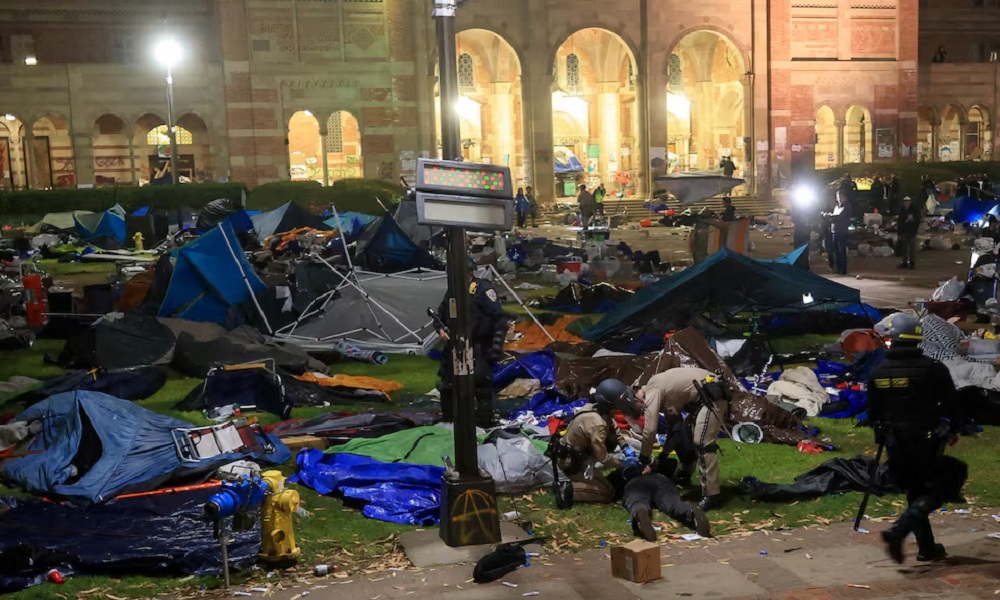
Hundreds of helmeted police swarmed the site of a pro-Palestinian protest at the University of California at Los Angeles early on Thursday, firing flash bangs, arresting defiant demonstrators and dismantling their encampment.
The pre-dawn police crackdown at UCLA marked the latest flashpoint in mounting tensions on U.S. college campuses, where protests over Israel’s war in Gaza have led to student clashes with each other and with law enforcement, Reuters reported.
“I’m a student here. I’m an English major,” one student said to television cameras, as police dragged him away. “Please don’t fail us. Don’t fail us.”
Prior to moving in, police urged demonstrators in repeated loudspeaker announcements to clear the protest zone, which occupied a central plaza about the size of a football field.
After massing around the campus for hours, officers eventually moved through the area in lines holding batons as protesters – some in white helmets – linked arms, attempting to block their advance.
Live TV footage showed officers taking down tents, tearing apart barricades and removing the encampment, while arrested protesters sat with their hands restrained behind their backs with zip-ties.
Students have rallied or set up tent encampments at dozens of schools in recent days, calling for an immediate ceasefire in Gaza and demanding schools divest from companies that support Israel’s government. Many of the schools, including Columbia University in New York City, have called in police to quell the protests.
Campus clashes
At UCLA, dozens of loud explosions were heard during the clash from flash bangs, or stun grenades, fired by police as the moved into the camp in the early morning hours.
Demonstrators, some carrying makeshift shields and umbrellas, sought to block the officers’ advance by sheer numbers, while chanting “push them back” and flashing bright lights in the eyes of the police.
Others on the opposite side of the camp gave up quickly, and were seen walking away with their hands over their heads under police escort.
Local television station KABC-TV estimated 300 to 500 protesters had been hunkered down inside the camp, many wearing the traditional Palestinian keffiyeh scarves, while around 2,000 more had gathered outside the barricades in support, Reuters reported.
Those numbers dwindled on Thursday as protesters left the camp and were arrested.
Some of the protesters had been seen donning hard hats, goggles and respirator masks in anticipation of the siege a day after the university declared the encampment unlawful.
By sunrise, the plaza was strewn with detritus from the destroyed encampment: tents, blankets, food containers, a Palestinian flag, an upturned helmet. A line of officers carrying batons stood at the plaza’s edge, while a small group of remaining protesters shouted chants at them nearby.
The protests follow the deadly Oct. 7 attack on southern Israel by Hamas militants from the Gaza Strip, which killed 1,200 people and saw dozens taken hostage, and an ensuing Israeli offensive that has killed about 34,000 and created a humanitarian crisis.
Protesters have called on President Joe Biden, who has steadfastly supported Israel’s right to defend itself, to do more to stop the bloodshed and ease the humanitarian crisis.
The campus demonstrations have been met with counter-protesters accusing them of fomenting anti-Jewish hatred. The pro-Palestinian side, including some Jews opposed to Israeli actions in Gaza, say they are being unfairly branded as antisemitic for criticizing Israel’s government and expressing support for human rights.
The issue has taken on political overtones in the run-up to the U.S. presidential election in November, with Republicans accusing some university administrators of turning a blind eye to antisemitism.
Crackdown a day after clashes
UCLA had canceled classes for the day on Wednesday following a violent clash between the encampment’s occupants and a group of masked counter-demonstrators who mounted a surprise assault late Tuesday night on the tent city.
The occupants of the camp, set up last week, had remained mostly peaceful before the melee, in which both sides traded blows and doused each other with pepper spray.
Members of the pro-Palestinian group said fireworks were thrown at them and they were beaten with bats and sticks. University officials blamed the disturbance on “instigators” and vowed an investigation.
The confrontation went on for two or three hours into early Wednesday morning before police restored order. A spokesperson for California Governor Gavin Newsom, a Democrat, later criticized the “limited and delayed campus law enforcement response” to the unrest as “unacceptable”.
Taylor Gee, a 30-year-old pro-Palestinian protester and UCLA law student, said the police operation on Thursday felt “especially galling” to many protesters given the slow police response a night earlier.
“For them to come out the next night to remove us from the encampment, it doesn’t make any sense, but it also makes all the sense in the world,” he said.
UCLA officials said the campus, with nearly 52,000 students, would remain shuttered except for limited operations on Thursday and Friday.
The police action at UCLA came after police in New York City on Tuesday arrested pro-Palestinian activists who occupied a building at Columbia University and removed a tent city from the campus of the Ivy League school.
Police arrested about 300 people at Columbia and City College of New York, Mayor Eric Adams said.
World
Russian missile attack wounds 88 in Ukraine’s Sumy, officials say
Zelenskiy said Russia was “the only entity prolonging this war and tormenting both our people and the entire world.
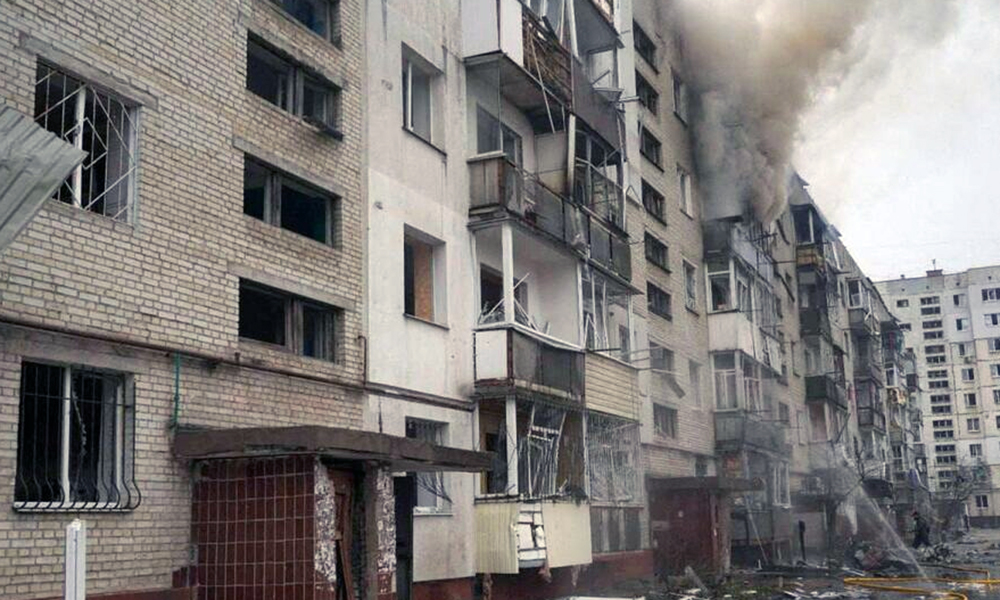
A Russian missile attack hit a densely-populated district of Ukraine’s northeastern city of Sumy, wounding 88 people, including 17 children, on Monday as ceasefire talks, ploughed on, officials said.
Regional governor Volodymyr Artiukh announced the latest casualty toll on national television. He said many more children had escaped injury as they had been evacuated to air raid shelters, Reuters reported.
“They were in the area in a densely-populated area hit by the enemy strike,” Artiukh told the television.
“Two schools fell within the impact zone. I was present when our rescuers cleared the locations where the children were. They were in protective structures. All the children were rescued and evacuated to a safe place.”
Several high-rise residential blocks in the city centre were also damaged, read the report.
Artiukh had earlier spoken in a video that he said was shot at the scene with heavy black smoke, fires and a car with shattered windows in the background. Smoke also rose from the upper floors of a five-storey residential block nearby.
Ukrainian President Volodymyr Zelenskiy deplored the attack in his nightly video address as the latest example of “losses, pain and destruction, something Ukraine never wanted.”
The missile struck the city as Russian and U.S. officials met in Saudi Arabia to discuss a possible ceasefire.
Zelenskiy said Russia was “the only entity prolonging this war and tormenting both our people and the entire world.
“To force Russia into peace, strong measures and decisive actions are needed,” he said. “We are ready to support every strong initiative that makes diplomacy more effective.”
Foreign Minister Adrii Sybiha said Moscow was speaking of peace “while carrying out brutal strikes on densely populated residential areas in major Ukrainian cities.”
“Instead of making hollow statements about peace, Russia must stop bombing our cities and end its war on civilians,” Sybiha said.
Acting Sumy mayor Artem Kobzar said on Telegram an industrial facility was attacked but did not name it.
Sumy, about 30 km (20 miles) from the Russian border, comes under constant drone and missile strikes from Russia.
World
Putin and Trump may have spoken more than twice, Kremlin says
Washington Post journalist Bob Woodward in his 2024 book “War” reported that Trump had direct conversations as many as seven times with Putin after he left the White House in 2021.

Russian President Vladimir Putin and U.S. President Donald Trump may have had more contacts than the two publicly announced telephone calls over recent months, the Kremlin said in video footage published by state television on Sunday.
Trump, who says he wants to be remembered as a peacemaker, has repeatedly said that he wants the three-year conflict in Ukraine to end and has warned of the risks of it escalating into a world war between the United States and Russia.
There have so far been two announced phone calls between Putin and Trump this year – on Feb. 12 and on March 18 – though there has been speculation about much more frequent contact, and also reports that they spoke before Trump was elected last year.
When asked by the most prominent Kremlin correspondent for state television about remarks by Trump that indicated there may have been more than two calls, Kremlin spokesman Dmitry Peskov said information had been released about those calls he knew of.
“Listen, we inform you about the conversations that we are aware of. But we can’t rule out everything else,” Peskov said.
State television’s Pavel Zarubin then asked: “So all sorts of nuances are possible as they say?” to which Peskov replied: “Well, that is how I would answer your question.”
The contacts between Trump and Putin have spooked European leaders who fear the United States could be turning its back on Europe in the hope of striking a peace deal with Russia as part of some broader grand bargain encompassing oil prices, the Middle East and competition with China.
Trump told the Washington Examiner, that he had been speaking to the Russian leader for weeks.
Before the contacts with Trump, Putin last spoke to a sitting U.S. president in February 2022, when he and Joe Biden spoke shortly before the Russian leader ordered tens of thousands of troops into Ukraine.
Washington Post journalist Bob Woodward in his 2024 book “War” reported that Trump had direct conversations as many as seven times with Putin after he left the White House in 2021.
Asked if that were true in an interview to Bloomberg last year, Trump said: “If I did, it’s a smart thing.” The Kremlin denied Woodward’s report.
Reuters, The Washington Post and Axios reported separately that Trump and Putin spoke in early November. The Kremlin also denied those reports.
Putin and Trump may have another phone call if Ukraine continues strikes on Russian energy infrastructure, Peskov said.
Putin agreed to the suspension of such attacks in a phone call with Trump last week. Kyiv, which has said it would be willing to take part in such a partial ceasefire if a document setting out its terms is agreed, has accused Russia of not abiding by Putin’s order, something Moscow denies.
“While the Russian side has been sticking to its word for several days now, the word that the president gave, and to the president’s command, which immediately came into force and was immediately implemented, and is still being implemented, the same cannot be said of the Kyiv regime”, Peskov said.
Russia and Ukraine accused each other on Friday of blowing up a Russian gas pumping station in a border area where Ukrainian troops have been retreating. Russia said on Saturday it reserves the right to a “symmetrical response” to Ukrainian attacks on Russian energy facilities.
Asked if Ukraine’s violation of the agreement may become a reason for another Putin-Trump call, Peskov said: “Absolutely. The presidents confirmed their intention to continue contacts as necessary.”
In another clip released on Zarubin’s Telegram channel earlier on Sunday, Peskov said the latest phone call between Putin and Trump was “a step towards a face-to-face meeting”, adding that Russia-U.S. talks in Riyadh scheduled for Monday would also be such a step, Interfax news agency reported.
World
Thousands of federal agents diverted to Trump immigration crackdown
Trump’s hardline approach to deporting immigrants has intensified America’s already-stark partisan divide
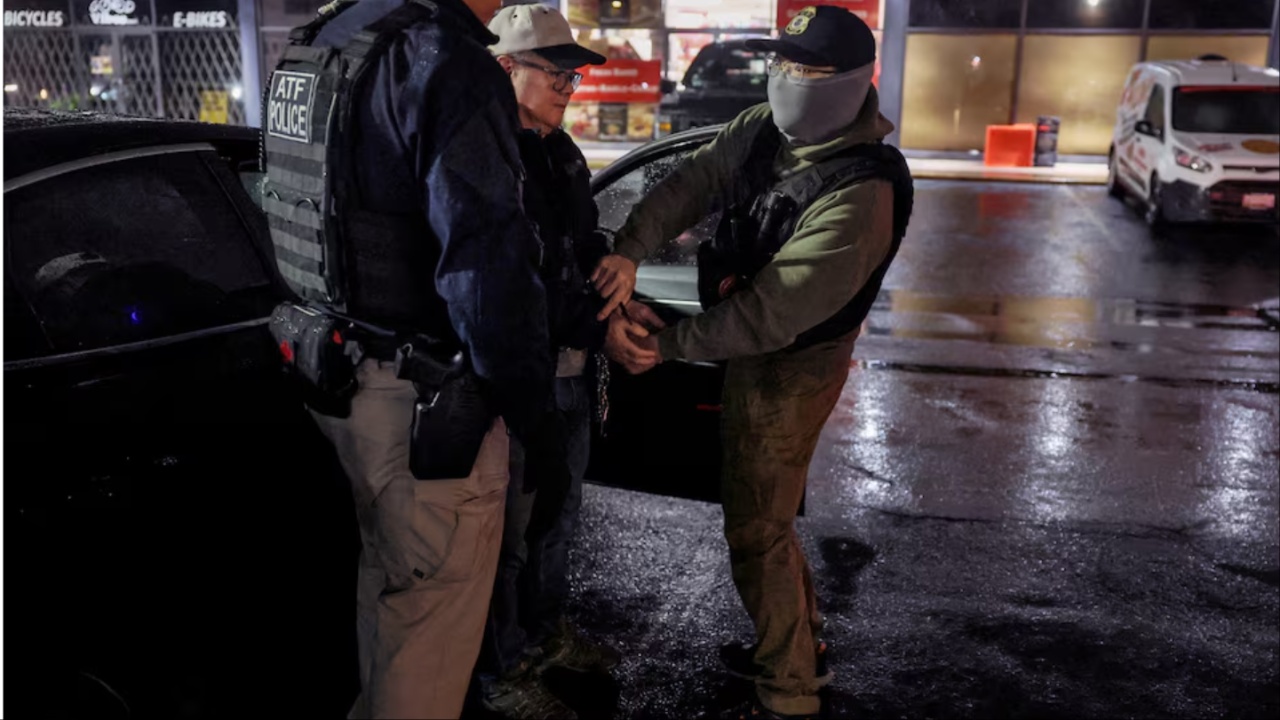
Federal agents who usually hunt down child abusers are now cracking down on immigrants who live in the U.S. illegally, Reuters reported.
Homeland Security investigators who specialize in money laundering are raiding restaurants and other small businesses looking for immigrants who aren’t authorized to work and agents who pursue drug traffickers and tax fraud are being reassigned to enforce immigration law.
As U.S. President Donald Trump pledges to deport “millions and millions” of “criminal aliens,” thousands of federal law enforcement officials from multiple agencies are being enlisted to take on new work as immigration enforcers, pulling crime-fighting resources away on other areas — from drug trafficking and terrorism to sexual abuse and fraud, Reuters reported Sunday.
This account of Trump’s push to reorganize federal law enforcement – the most significant since the September 11, 2001, terrorist attacks – is based on interviews with more than 20 current and former federal agents, attorneys and other federal officials.
Most had first-hand knowledge of the changes. Nearly all spoke on the condition of anonymity because they were not authorized to discuss their work.
“I do not recall ever seeing this wide a spectrum of federal government resources all being turned toward immigration enforcement,” said Theresa Cardinal Brown, a former Homeland Security official who has served in both Republican and Democratic administrations.
“When you’re telling agencies to stop what you’ve been doing and do this now, whatever else they were doing takes a back seat.”
In response to questions from Reuters, Homeland Security Assistant Secretary Tricia McLaughlin said the U.S. government is “mobilizing federal and state law enforcement to find, arrest, and deport illegal aliens.”
The Federal Bureau of Investigation declined to respond to questions about its staffing.
In a statement, the FBI said it is “protecting the U.S. from many threats.”
The White House did not respond to requests for comment.
The Trump administration has offered no comprehensive accounting of the revamp. But it echoes the aftermath of the 2001 attacks, when Congress created the Department of Homeland Security that pulled together 169,000 federal employees from other agencies and refocused the FBI on battling terrorism.
Trump’s hardline approach to deporting immigrants has intensified America’s already-stark partisan divide.
The U.S. Senate’s No. 2 Democrat, Dick Durbin, described the crackdown as a “wasteful, misguided diversion of resources.”
In a statement to Reuters, he said it was “making America less safe” by drawing agents and officials away from fighting corporate fraud, terrorism, child sexual exploitation and other crimes.
U.S. Deputy Attorney General Todd Blanche, in an interview with Reuters, denied the changes across federal law enforcement were hindering other important criminal investigations.
“I completely reject the idea that because we’re prioritizing immigration that we are not simultaneously full-force going after violent crime.”
He said the crackdown was warranted. “President Trump views what has happened over the last couple years truly as an invasion, so that’s how we’re trying to remedy that.”
On January 20, his first day back in office, Trump signed an executive order, directing federal agencies to team up to fight “an invasion” of illegal immigrants. He cast the nation’s estimated 11 million immigrants in the U.S. illegally as the driving factor behind crime, gang violence and drug trafficking – assertions not supported by government statistics, – and accused immigrants of draining U.S. government resources and depriving citizens of jobs.
Almost immediately, federal law enforcement started posting photos of the crackdown to social media: agents wore body armor and jackets emblazoned with names of multiple agencies – including the FBI, Drug Enforcement Administration, and the Bureau of Alcohol, Tobacco, Firearms and Explosives, known as ATF – during raids on immigrants without proper legal status.
Before this year, ATF had played almost no role in immigration enforcement. It typically investigated firearms offenses, bombings, arson and illicit shipments of alcohol and tobacco.
But since Trump’s inauguration, about 80% of its roughly 2,500 agents have been ordered to take on at least some immigration enforcement tasks, two officials familiar with ATF’s operations said. The ATF agents are being used largely as “fugitive hunters” to find migrants living in the U.S. illegally, one of the officials said.
The DEA, whose roughly 10,000 staff have led the nation’s efforts to battle drug cartels, has shifted about a quarter of its work to immigration operations, said a former official briefed by current DEA leaders on the changes. Two other former officials described the commitment as “substantial” but did not know precisely how much work shifted.
Many of the reassigned federal officials have had little training or experience in immigration law, the sources said.
The results, so far, are mixed: the number of migrants seeking to cross the southern U.S. border in February was the lowest in decades and the number of people detained over immigration violations has surged. That hasn’t yet led to an increase in deportations, but experts expect a jump in those numbers in coming months.
-

 Latest News5 days ago
Latest News5 days agoPakistan once again urges IEA to act against militants
-

 Sport4 days ago
Sport4 days agoAFC Beach Soccer: UAE thrash Afghanistan 7-1 in opener
-

 Regional5 days ago
Regional5 days agoAt least 91 killed in Gaza as Israel abandons ceasefire, orders evacuations
-

 Latest News4 days ago
Latest News4 days agoAmerican freed by IEA reunited with wife, former cellmate, in US
-
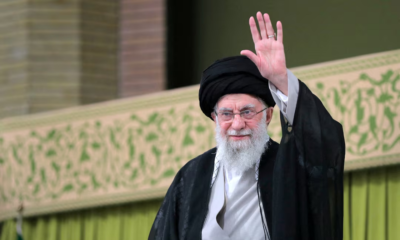
 Regional4 days ago
Regional4 days agoIran’s leader says Yemen’s Houthis act independently, warns against US action
-

 Latest News4 days ago
Latest News4 days agoBayat Foundation delivers Ramadan aid to needy families in Bamyan
-

 International Sports3 days ago
International Sports3 days agoBoxing legend George Foreman dies at 76
-
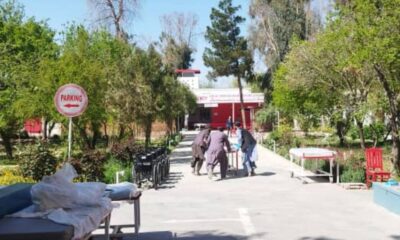
 Latest News4 days ago
Latest News4 days agoEighteen injured after dispute between two brothers in Helmand






















